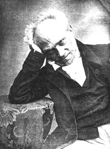![]()
![]()
Continental Philosophy
Schopenhauer: The Ascetic
Primary Sources:
- Schopenhauer, The World as Will and Representation II (WWR II), Chapters 46, 49, pp. 573-588, 634-639 (Handout)
- Nietzsche, The Genealogy of Morals, Third Essay, Sections 6, 7, in BN, pp. 539-544
Background:
From the Routledge Online Encyclopedia:
The Fourth Book of The World as Will and Representation concerns ethics, taken broadly to include questions about the value of human existence, and what kind of happiness or salvation we may hope for. Schopenhauer gives his views here on the nature of morality and the question of free will and responsibility….
The core of Schopenhauer’s pessimistic assessment of the value of human life lies once again in the opposition between the individual and the world as a whole. One’s existence as a bodily, striving individual emerges not only as illusory (when viewed from the highest metaphysical vantage point), but as pernicious. To be an individual in which will manifests itself is inevitably to be open to suffering. But neither the striving of which the individual’s life is full, nor the suffering which accompanies it, nor the temporary achievement of satisfaction which so soon induces boredom, has any higher point or value. Schopenhauer concludes that existence as an individual human being is always a worse alternative than nonexistence. ‘In fact,’ he proclaims, ‘nothing else can be stated as the aim of our existence except the knowledge that it would be better for us not to exist’. He also argues that we inhabit the worst of all possible worlds [this is the subject of Chapter 46].
Death is not something to fear, in Schopenhauer’s view, since the world-will which expresses itself in this one fleeting individual continues undisturbed; death is ‘the great opportunity no longer to be I…the moment of that liberation from the one- sidedness of an individuality that does not constitute the innermost kernel of our true being’. Despite this, Schopenhauer does not approve of suicide, which he regards as a failure to accept life on proper terms. The suicide affirms life, but revolts against the particular sufferings life contains. The contrasting attitude which Schopenhauer advocates is denial of the will to life, an attitude which accepts the state of being alive but acquiesces in the suffering and the non-fulfillment of desires which it brings…..
There are two routes to this turning of the will. One is the life of what Schopenhauer calls a saint. Such a person has knowledge of the illusoriness of individuation, and their individual will is ‘quieted’ thereby. The attitude of saints is one of such overwhelming compassion that they do not seek to further their own ends in distinction from those of others, nor to avoid harm to themselves. The other path leading to the turning of the will is to undergo suffering so great that one’s will to life gives out spontaneously, while yet one is still alive. Those in whom the will has turned attain a state which Schopenhauer describes as ‘resignation, true composure, and complete will-lessness’. He asks us to consider the blissful state of aesthetic contemplation, and then to imagine it prolonged: such, he claims, is the state of will-less self-denial that is the only genuine ‘salvation’ for humanity [this is the subject of Chapter 49]. Since our existence as bodily, striving individuals is one we would have been better without, the only remedy lies in achieving a vision of the world which attaches the lowest possible importance to one’s individuality.
In the section from Nietzsche, we see Nietzsche’s connection between the aesthetic and the ascetic, and how critical he is of these, particularly the latter.
Questions:
- Why does Schopenhauer believe that “the happiest moment of the happy man is that of his falling asleep, just as the unhappiest moment of the unhappy man is that of his awaking?
- How does Schopenhauer dismiss optimism?
- What is Schopenhauer’s “Road to Salvation” exactly?
- How is Nietzsche critical of these ideas?
I love Apache! So should you!
![]()



